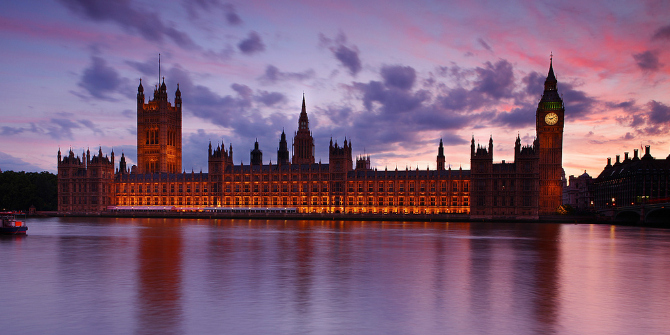 Despite the sudden – though hardly unprecedented – resignation of their long-serving leader, it is hard to deny that UKIP is having a productive year. And it might be about to get even better, argues Ben Margulies. From Labour’s struggle with working class voters to the wrangling over Article 50, it’s all ammunition for the populist party. Now the question is whether they can capitalize on it.
Despite the sudden – though hardly unprecedented – resignation of their long-serving leader, it is hard to deny that UKIP is having a productive year. And it might be about to get even better, argues Ben Margulies. From Labour’s struggle with working class voters to the wrangling over Article 50, it’s all ammunition for the populist party. Now the question is whether they can capitalize on it.
UKIP can claim at least partial credit for the June 23rd referendum on European Union membership (or all of it). It just made an unprecedented breakthrough in May’s Welsh Assembly elections, and though the first-past-the-post system continues to impede UKIP’s progress at Westminster, the party did succeed in winning an eighth of the popular vote in May.
Admittedly, UKIP might struggle to find a replacement for Nigel Farage; populist parties are often identified with charismatic leaders. That said, many of the most successful of these parties have survived and thrived after leadership transitions. In any case, it is the moment that will likely prove more important to determining UKIP’s future than the man or woman who succeeds Farage. And that moment is – alarmingly for the established parties – highly favourable, as every choice in the post-Brexit world risks redounding to the populists’ benefit.
Once the parties finish their leadership election rounds, the next question on the agenda will be the invocation of Article 50 of the Treaty on the Functioning of the European Union (TFEU), and the shape of the trade deal that Westminister will strike with the EU afterwards. The key question in the latter case will be what access the United Kingdom secures to the single market, the Delors-Thatcher project that guarantees the free movement of goods, services, capital and labour.

The UKIP battle bus from 2009 (image credit: Euro Realist Newsletter CC BY-SA 2.0)
That negotiation will expose the great divide within the Brexit camp. Many Conservative Brexit supporters are arch-neoliberals who denounce Brussels as an interfering engine of regulation. However, they do not necessarily wish to leave the single market, or at least lose privileged access to it. The mainly Europhile business elites – especially the larger banks, if not the whole finance sector – will be more inclined to accept free movement of labour into the UK in exchange for access to the single market. German Chancellor Angela Merkel has made it clear that access to the single market requires accepting free movement.
However, a very large proportion of Brexit voters were “modernization losers” with little stake in the single market, or the neoliberal economy as a whole. That exclusion coincides with and shapes their positions on other divides – their social conservatism versus the social liberalism of the metropolis, their nationalism (often English rather than British) and their opposition to immigration and threats to their national identity. Many of these voters see immigration as a threat to their way of life, and immigrants as rival claimants on scarce resources (of course, it is neoliberalism and its globalization project that made those resources scarce in the first place, a point I will revisit later). In any case, immigration was the most broadly cited issue in a poll Ipsos MORI conducted just before the vote on June 23.
If an EU-UK deal fails to restrict immigration, it will be seen as a betrayal. Furthermore, it will be sold as a betrayal, and the narrative of betrayal fits UKIP better than any other party. Almost all definitions of “populist” cite the populist way of framing political events; the good people versus the corrupt elite. Betrayal is baked into the explanatory scheme – it is expected. Prior to polling day, two-thirds of UKIP voters thought the government would attempt to rig the election by erasing Leave voters from the ballot papers (campaigners advised voters to bring pens). What happens when the betrayal becomes real? As Matthew Goodwin explains:
“The vote for Brexit was primarily driven by public concerns over free movement and migration. Consequently, should Conservative Eurosceptics fail to deliver restrictions on free movement, then it would be the equivalent of pouring gasoline over the UKIP fire.”
Alternatively, the anti-immigrant camp can get what it wants, and sacrifice access to the single market to obtain closer control of the borders. There is an excellent chance that many working- and lower middle-class supporters of Leave may suffer materially from such an outcome. They probably will not care much that many multinational corporations are leaving the capital; after all, they are effectively excluded from that globalized economy. But a difficult Brexit will depress investment, demand and tax revenues throughout the British economy. Simply reducing the number of EU migrants will cut into revenues, since they are net contributors to the British economy. As Thomas Piketty pointed out, GDP only grows as a function of either population growth and/or increases in productivity, and the latter has grown very slowly in the UK since 2008. Slower economic growth will do nothing to alleviate the suffering of Britain’s left-behind zones in the Midlands, Northern England and South Wales.
Still worse for the modernization losers, the government that faces this recession will, in the short term, almost certainly be a Conservative one. The modern Conservative response to a decline in revenue is not stimulus, but, as Nick Pearce points out, austerity:
“Under the guise of drawing investment back to the UK, the drumbeat for cutting corporation tax, deregulating the labour market and shrinking the welfare state will soon start in earnest. Without countervailing pressure, the Brexit working class will pay for their votes in cuts to public services and tax credits.”
Many such voters chose Leave to maximize the resources available to them, the ones they perceived as going to immigrants instead. The hoped for Brexit dividend will not appear.
When that happens, who will champion their cause? Most likely, parties like UKIP. Radical-right populist parties have, for several years, championed calls to restrict and increase welfare for native-born lower-class citizens, while excluding immigrants from benefits and restricting immigrants’ arrival. By combining calls for public welfare spending with social conservative and nationalist appeals, UKIP can scoop up many of these voters. Some will defect from the Conservatives – who will, after all, be responsible for the austerity, much as right-wing voters furious with Republican elites abandoned them for Donald Trump.
Others will abandon Labour, which has been losing working-class voters for the better part of the last two decades. Labour cannot promise to restrict immigration or restore the traditional ethics and values of the 20th-century working class; unlike UKIP, it cannot afford to lose its middle-class support base in a bid for working-class votes. As I have argued before, Ed Miliband’s Labour made repeated attempts to curry favour with working-class conservatives, without avail. Richard Seymour’s fine new book about Jeremy Corbyn traces how New Labour repeatedly took tough stances on crime, immigration and “welfare dependency,” none of which prevented the gradual degradation of the party’s working-class base.
There are other scenarios that are possible, but they benefit UKIP too. What if the government or Parliament simply refuses to invoke Article 50? Then UKIP gets a new grievance on which to hang its populist rhetoric and rally Leave voters. Indeed, it would be an even better one than an insufficiently restrictive deal on immigration; not all Leave voters are anti-immigration, but presumably the vast majority will object to being ignored by “the elites”, whatever their class. And what if Scotland tries to block Brexit? Well, the Leave campaign already drew on English nationalism. Pearce pointed out in his article that there was no English parliament to advocate for the pro-Leave voters in England during exit negotiations. UKIP could provide a substitute.
None of these factors mean that UKIP will, in fact, prosper in the aftermath of Brexit. The party is not especially well-organized or well-funded. There is no guarantee its next leader will be as successful as Nigel Farage. However, almost every scenario at present seems to bode well for the party. The one exception might be an early general election, called before any of these betrayals or conflicts can occur. Regardless of whether the new Conservative prime minister wants her or his (most likely her) own mandate, or whether a new Labour leader may feel especially daring, a new election might be in both their interests. Because Brexit was a moment, but the anger? That may be the movement.
 Ben Margulies is a postdoctoral researcher at the University of Warwick. A frequent commentator on European politics, he obtained his PhD at the University of Essex in 2014. He tweets @chequeredfuture.
Ben Margulies is a postdoctoral researcher at the University of Warwick. A frequent commentator on European politics, he obtained his PhD at the University of Essex in 2014. He tweets @chequeredfuture.







